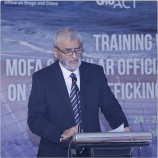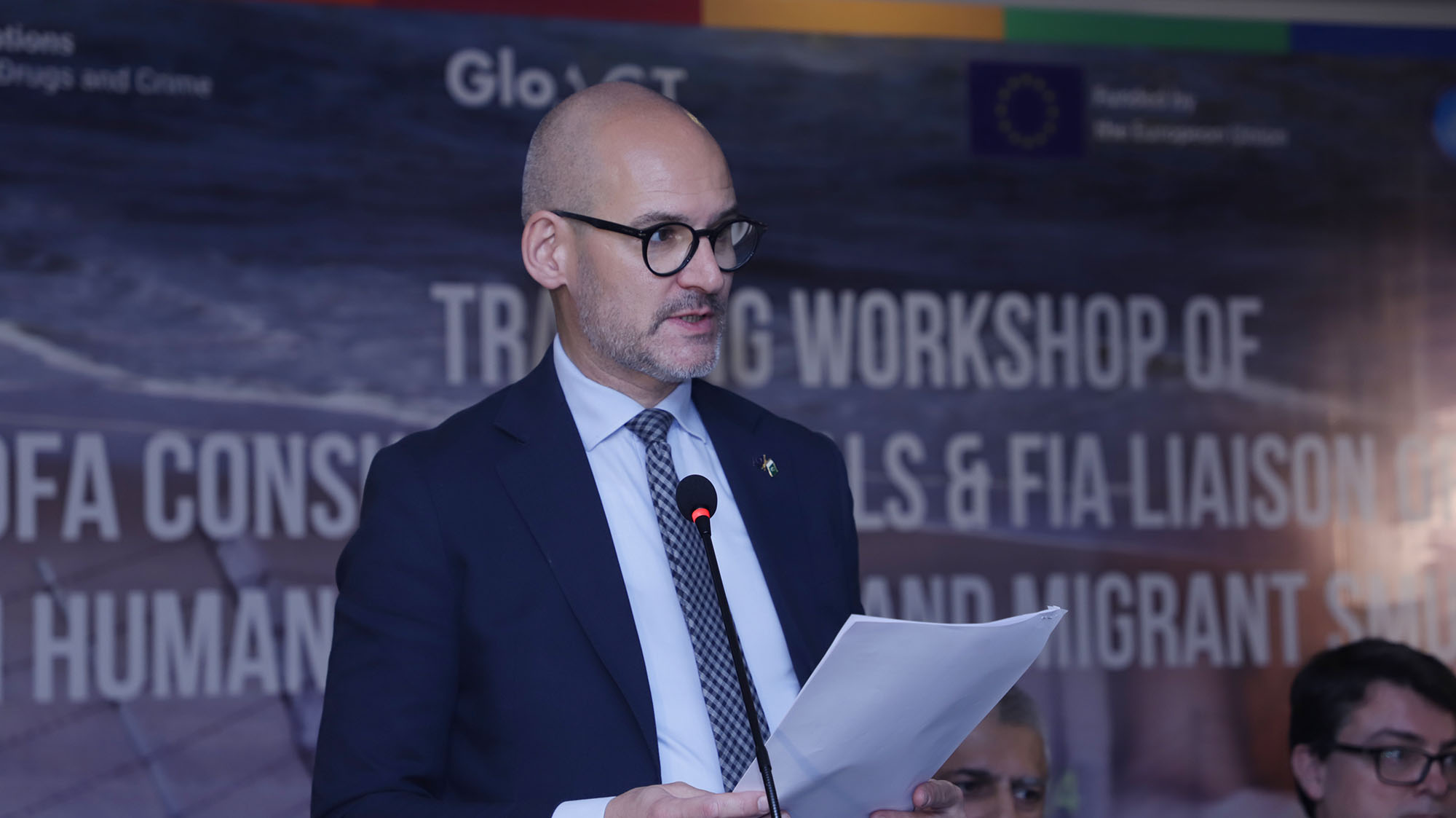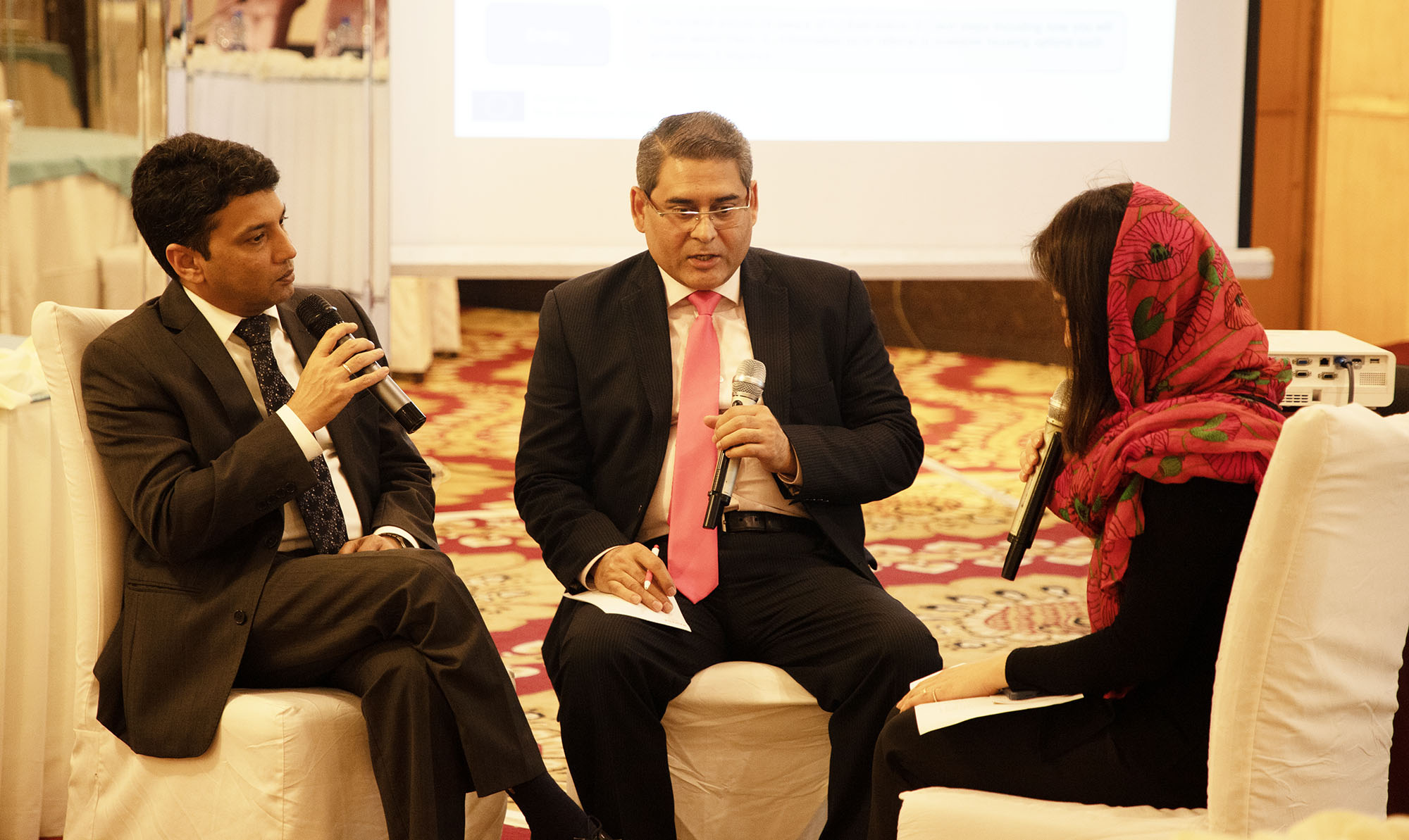UNODC Empowers MoFA and FIA Officials in Pakistan with Training Workshop on Countering Human Trafficking and Migrant Smuggling

24 April 2024, Islamabad - Human trafficking and migrant smuggling are heinous crimes and pervasive issues that continue to affect nations worldwide. Recognizing the vital role of consular and liaison officers stationed at different locations in destination and transit countries, UNODC, in collaboration with the Federal Investigative Agency (FIA) and Ministry of Foreign Affairs (MoFA) coordinated a two-day workshop to enhance the officials' capacities, broaden their knowledge and understanding of human trafficking and migrant smuggling, and increase awareness of international and regional frameworks.
Held from 24 to 25 April 2024, the workshop was a collaborative effort. UNODC, under the European Union-funded PROTECT project implemented within the framework of GLO.ACT, facilitated the training workshop for the FIA liaison and MoFA diplomatic personnel. This collaboration was a testament to the shared commitment and effort in combating human trafficking and migrant smuggling, providing them with skills and knowledge on how to identify, protect, and assist victims of trafficking and vulnerable migrants.

Addressing the participants, Aimée Comrie, Project Coordinator of GLO.ACT PROTECT, explained that "the workshop aims to establish a sustainable framework for ongoing capacity-building initiatives, ensuring diplomatic and liaison personnel are continuously equipped to respond to the challenges posed by human trafficking and migrant smuggling."
The workshop began with a tour de table, which enabled participants to outline their current roles and responsibilities and the challenges and barriers they have encountered regarding human trafficking and migrant smuggling. The role of consular and liaison officials in addressing trafficking in persons and migrant smuggling and taking a deeper dive into this matter was a session led by Dr Ehsan Sadiq, DG of the National Police Bureau and Focal Point on Organized Crime.
The training benefited from the participation of internationally recognized experts representing UNODC, the European Union, and ICMPD. First, to enhance the knowledge and awareness of participants around human trafficking and migrant smuggling, Ms. Comrie focused on defining TIP and SOM as specific crime types. Next, Jee Aei Lee, GLO.ACT PROTECT Legal and Policy Officer introduced international and national legal and policy frameworks governing trafficking and smuggling. The workshop further entailed interventions on indicators of trafficking and smuggling, presented by Emmanuelle Kunigk, GLO.ACT PROTECT Strategy and Stakeholder Engagement Expert, guidance on providing protection and assistance to victims, as well as an overview of international cooperation mechanisms and networks, which also benefited from the intervention of Saad Rehman Khan from ICMPD. Furthermore, the participants received an overview of the European Union Visa System from Tomislav Tadic, from the Visa Policy Unit of the European Union.
 On day two, participants analyzed a case study involving a Pakistani-Romanian criminal network that facilitated the illegal entry of Pakistani, Bengali, and Egyptian nationals into the European Union. Moreover, participants had the opportunity to engage in interactive role-play and group work to apply their skills.
On day two, participants analyzed a case study involving a Pakistani-Romanian criminal network that facilitated the illegal entry of Pakistani, Bengali, and Egyptian nationals into the European Union. Moreover, participants had the opportunity to engage in interactive role-play and group work to apply their skills.
Looking ahead, UNODC will develop a Guidance Booklet for consular and liaison officials, aiming to strengthen consular officials' understanding of the crimes. Over 20 Ministry of Foreign Affairs and Federal Investigative Agency officials participated in the meeting.
***
PROTECT: Improving Migration Management & Migrant Protection in Selected Silk Route Countries
The United Nations Office on Drugs and Crime (UNODC) is implementing the European Union-(EU) funded PROTECT initiative within the framework of GLO.ACT across Afghanistan, Iraq, Pakistan, and Tajikistan. This initiative also addresses challenges in the broader Central Asia region, including the Kyrgyz Republic, Kazakhstan, and Uzbekistan, with a primary focus on enhancing the effectiveness of responses to trafficking in persons (TIP) and smuggling of migrants (SOM), particularly in relation to criminal justice. Meanwhile, the International Centre for Migration Policy Development (ICMPD) is responsible for implementing the PROTECT initiative in Afghanistan (specifically through virtual MRC Afghanistan), Kazakhstan, the Kyrgyz Republic, Pakistan, Tajikistan, and Uzbekistan. Their primary objectives include improving gender-sensitive and rights-based migration governance at the national level and establishing Migrant Resource Centres (MRCs).
This project is funded by the European Union.


